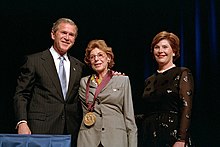Helen Frankenthaler
American painter
Helen Frankenthaler (12 December 1928 – 28 December 2011) was an American post-painterly abstraction artist. Born in New York City, her work was influenced by Jackson Pollock, with whom she also was involved in the 1946–1960 abstract art movement.

Quotes about Helen Frankenthaler
edit- We [ Morris Louis and Kenneth Noland ] were interested in Pollock but could gain no lead from him. He was too personal. But Frankenthaler showed us a way – a way to think about and use, color.
- Quote of Kenneth Noland, c. 1954, as cited in Abstract Art, Anna Moszynska, Thames and Hudson 1990, p. 194
- Noland is referring to their common visit in Frankenthaler's studio in 1953
- ..An artistic personality and a life personality often have no connection. In Helen's case, the controlling part of her is not part of the artistic personality. Her lyricism as an artist comes from a great personal inner liberation.
- Quote of Robert Motherwell; as cited in interview with Helen Frakenthaler, The ‘New York Times, 1989 by Deborah Solomon
- When I first met Helen [1950-51], she was a standard Cubist just out of college. Abstract Expressionism changed her direction.
- Quote of Clement Greenberg; as cited in interview with Helen Frakenthaler, The ‘New York Times, 1989 by Deborah Solomon
- Helen [Frankenthaler] was away for the weekend [in May 1952 or 1953], but Clem had the key to her studio and let us [Kenneth] Noland and Morris Louis ] in on a Sunday morning. We saw not just 'Mountains and Sea' but a group of pictures she had recently made. We felt exhilarated. The idea of being able to spread color out along the surface of the picture without having it create an illusion - this was very appealing to us.
- Quote of Kenneth Noland; as cited in interview with Helen Frakenthaler, The ‘New York Times, 1989 by Deborah Solomon
- Critics have not unanimously praised Ms. Frankenthaler's art. Some have seen it as thin in substance, uncontrolled in method, too sweet in color and too 'poetic.' But it has been far more apt to garner admirers like the critic Barbara Rose, who wrote in 1972 of Ms. Frankenthaler's gift for 'the freedom, spontaneity, openness and complexity of an image, not exclusively of the studio or the mind, but explicitly and intimately tied to nature and human emotions.'
- Quote by Grace Glueck, in 'Helen Frankenthaler, Abstract Painter Who Shaped a Movement, Dies at 83', in 'The New York Times', Retrieved, 27 December, 2011
- Greenberg didn't like Frankenthaler's painting, but he did ask her out for a drink [c. 1950-51], and for the next five years, the pair underwent what she [Helen] described to me as 'a painting bath'. They went to every exhibition in town, from Pollock to Sir Alfred Munnings, the English horse painter (and an enemy of modernism). They'd get the catalogues to each show, and grade the paintings in them. [Helen: 'One check meant we liked it. Two checks was pretty good. Three was wow!' And always a lot of talk, about what made one painting more successful than another. [Helen:] 'This seems the opposite of that lofty beautiful experience that art is supposed to be', she recalled. [Helen: 'Every painting is supposed to be a valid expression and interesting. But the truth is some work and some don't. That happens with all painters in every age'. Greenberg had a great 'eye'; he could tell a first-rate painting from a second-rate one, but Frankenthaler wanted to make paintings that worked, so she looked and looked, seeking to develop her own eye.
- Quote of Piri Halasz, in 'Defying Categories: Helen Frankenthaler, 1928-2011', on Artcritical, Dec 2011
External links
edit- Oral history interview with Helen Frankenthaler, conducted by Barbara Rose - 1968; Archives of American Art, Smithsonian Institution
- 140 images of painting art by Helen Frankenthaler, on Wikiart
- interview with Deborah Solomon, in the 'New York Times', 1989]